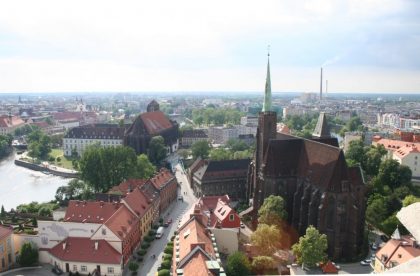Religious Studies Major and Minor
Whether you are religious or not, religion matters in the world today. Ask questions about life and its purpose. Study religious practices, sacred texts, conceptions of morality, rituals, and religious experiences from around the world, and see where they intersect and differ. Understanding religious traditions allows you to grow in empathy, articulate your values, and better understand the human experience.

Why Study Religions at Albion?
Religion has shaped and driven individuals and institutions in every culture. As a religious studies major at Albion, you’ll consider the most challenging questions of existence. Where did we come from? Why is there pain and suffering? Why are we not treated equitably? You’ll learn how different religious traditions have sought to answer these questions throughout history. You’ll analyze primary texts, religious literature, and philosophy. You’ll benefit from rigorous discussion in our small classes, build close relationships with your professors and peers, and develop keen critical and analytical skills.
What Will You Learn as a Religious Studies Major?
You’ll examine the perennial questions and answers posed by people around the world and throughout history. Why do we suffer? What is the purpose of life? What happens to us after we die? What does the past mean to us now? You’ll engage these questions through scriptures that have changed and continue to guide the course of human history, including the Hebrew Bible, the New Testament, the Qur’an, the Ramayana, the Bhagavad Gita, the Daodejing. You'll relate them to religious practices including rituals such as baptism, pilgrimage, worship, yoga, burial, cremation, and almsgiving. You'll approach the study of religion through comparison and consider how to answer these questions for yourself.
You’ll study the debates and dynamics of global religious traditions in their social and historical contexts, including their formative myths, sacred texts, spiritual practices, and rituals.
You’ll build your curriculum based on themes like gender, justice, and morality in expert-led courses about Hindu, Muslim, Buddhist, Jewish, Jain, Sikh, Christian, and Daoist traditions.
Highlights
Research

Participate in a directed study or write an honor’s thesis. Spend your summer researching your interests with funding from the Foundation for Undergraduate Research, Scholarship, and Creative Activity (FURSCA) and share your findings at the Elkin R. Isaac Student Research Symposium. Our students have presented their research at the Midwest American Academy of Religion Conference and the Annual Meeting of the Midwest Region of the Society of Biblical Literature.
Scholarships
At Albion, we celebrate excellence. Each year, our department recognizes students who excel in religious studies with scholarships and awards for current students.
Holocaust Studies Service-Learning Project in Poland

Travel to Wrocław, Poland to support the restoration of a local Jewish cemetery and help the Jewish community to tell its story. This project honors the place of a people who have mostly vanished from Wrocław and Poland in the wake of the Holocaust and helps the remaining community to reclaim an important cultural and historical artifact. As an act of historical recovery, this related course stands as an active rebuke of ethnic violence anywhere in the world.
Careers & Outcomes
As a student of religious studies, you’ll graduate with a deep understanding of humanity, past and present, and how individuals and societies translate core beliefs into concrete action. Students who major in religious studies develop compassion, empathy, ethics, and critical reasoning to go on to a variety of careers in law, medicine, clinical psychology, business, and other fields. The field of religious studies provides insight into family and global culture, justice work, and philosophical reason. Many of our students go on to graduate school in religion or law, while others begin careers in ministry, social services, writing or business.
Job Titles
- Pastor/Spiritual Leader
- Social Worker
- Lawyer
- Counselor
- K-12 Educator
- Physician
Graduate Programs
- Master of Arts in Comparative Religion, Western Michigan University